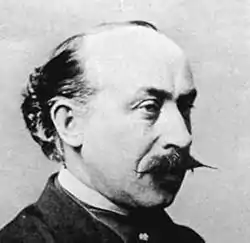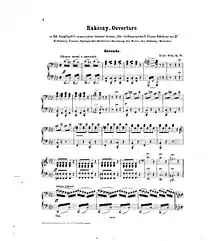Béla Kéler
Béla Kéler was a Hungarian composer of romantic music period and orchestral conductor. Béla Kéler was born as Albert Paul Keler (Adalbert Paul von Keler). He is also known in Hungarian as Kéler Béla. He was born on 13 February 1820 in City of Bártfa, Sáros County, Kingdom of Hungary, Austrian Empire (present-day Bardejov, Slovakia), and died on 20 November 1882 in Wiesbaden, German Empire. He was active in Hungary, Austria and Germany.
.jpg.webp)
Biography
Béla Kéler was born in 1820 in Bártfa (German: Bartfeld, Slovak: present-day Bardejov), Kingdom of Hungary as Albert Paul Keler, but German and Austrian sources also give Adalbert Paul von Keler. He descended from an ethnic German family on his father's side, but was ethnic Magyar on his mother's side.[1]

His father Stefan Keler (1781–1849) was a principal magistrate of Bártfa, from an old Bártfa burgher's family. His mother Anna Bóth (1793–1848)[2] was from the Hungarian Both de Botfalva noble family. They raised 13 children. Albert's siblings were Frederika, Stefan, Emilia, Antonia, Matilda, Augusta, Apollonia, Ferdinand, Viktor, Josefina, and Amalia. The household was German speaking; the majority of residents of Bártfa that time were Carpathian Germans.
As a little boy he studied violin with Franz Schiffer in Bártfa. He began his school education in 1834 in the Evangelical Lyceum of Lőcse (today Levoca, Slovakia). After that he studied in Evangelical College of Eperjes (today Prešov, Slovakia), and later briefly studied law and philosophy in Debrecen. Soon he left and picked up studies again in Eperjes.
After dropping out of law school,[3] he worked on a farm where he read a textbook by Johann Georg Albrechtsberger, the Austrian baroque composer. He then started practicing the violin. By the time he moved to Vienna, he was good enough to play in the orchestra of the Theater an der Wien. While holding this position, he studied with Simon Sechter. He became leader of the Gungl Band in Berlin in 1854, and the next year succeeded Augustin Lanner in Vienna. From 1856 to 1863, he was Kapellmeister of an infantry regiment in the Vienna garrison.[4] In 1867, he joined the Kur Orchestra in Wiesbaden, where he remained until 1873.[4][5] In the 1870s, he toured all over Europe.
He lived and worked in Eperjes, where he led a students' orchestra. In 1845, he moved to Vienna, Austria and in 1863 to Wiesbaden, Germany, where he lies buried. In his testament he donated all of his works to the city of Bártfa, where he was born.
Compositions

His best known piece Erinnerung an Bartfeld is written on the melodies of typical local folk songs of Sáros County. This piece was (partly) mistakenly rewritten by Johannes Brahms as Hungarian Dance No. 5 because Brahms thought it was a folk song, not an original work.[6] This was because Anton Bruckner copied the instrumentation and form (but not the harmony) of Kéler's Mazzuchelli-Marsch (also called Apollo-Marsch) exactly for his own March in E-flat major.[7] (The Apollo Marsch was later mistaken for a work of Bruckner's).
Kéler was very popular as a composer of orchestral and dance music, and was looked upon as one of the best of writers of violin solos.[5] His overtures and compositions for small orchestra were long popular in the United States and England.[4]
Heritage
Béla Kéler donated all of his works to the city of Bártfa. After the founding of the Šariš Museum in Bártfa in 1903 this collection became part of the permanent exhibition of the museum.
Today, Béla Kéler has his own exhibition screen near the entrance in the City Hall Museum in Bardejov, which is a part of the Šariš Museum. His personal correspondence, manuscripts and printed works, portraits and his memorial tablet are kept and displayed there.[8]
References
- "Life of Great Master of Music". Museum of Bardejov. Retrieved 12 November 2020.
- p. 458 Lamb (2001) Andrew
- Gilman, D. C.; Peck, H. T.; Colby, F. M., eds. (1905). . New International Encyclopedia (1st ed.). New York: Dodd, Mead.
- Rines, George Edwin, ed. (1920). . Encyclopedia Americana.
- "Kéler Béla" by Andrew Lamb in New Grove ed. Stanley Sadie, (2001) vol. 13 p. 458
- Preface to Band XII/8 of the Complete Works of Anton Bruckner by Rüdiger Bornhöft translated by Eugene Hartzell (1996) Vienna: Musikwissenschaflticher Verlag, unnumbered right page before score. The tome has the score of the Bruckner's March in E-flat, with the Apollo-Marsch, as an "appendix."
- "Béla Kéler exhibitions in Bardejov Museum".